|
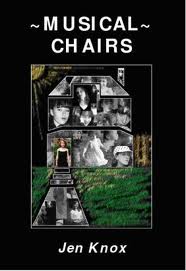
The Smoking Poet:
Welcome to our smoky lounge, Jen! In our Fall 2010 issue of The Smoking Poet, we
published a book review of your memoir, Musical Chairs, which we have reprinted in this issue for readers who may have
missed it or want to reread it as they get to know a little more about you. Can you tell us in a nutshell what a reader will
find in Musical Chairs and why you felt driven to write it?
Jen Knox: It is an
honor to be here.
Musical Chairs is divided into three parts that retrace my experiences as a child runaway, a stripper and eventually,
a self-conscious young woman who fumbles her way into the world of academia. What readers will find in my memoir is a realistic
look at a girlhood that was largely misspent. They will not find a tale of victimhood
or a glamorized account of the world of stripping and binge drinking. They will find my truth, nothing more or less.
The writing of Musical Chairs emerged from utter panic. I begin the book with a scene in which I am working at a bookstore. I
am a part-time college student, I am dating the man who would become my husband, and my life is remarkably peaceful. Yet,
it was at this time in my life that I began to suffer from crippling panic attacks. This is still rather mysterious to me,
but I feel these panic attacks were a gift because it was from a desire to reconcile my past and move on that I began to write.
When I began writing about my past,
I had no intention of sharing my story. My father didn’t even know I was a stripper, and it made my stomach churn just
to think of his finding out. But as years passed, and my story emerged on pages, little by little, I began to see my life
in a different light. I no longer felt like that girl I was writing about; I felt as though I needed to write to her because
she was finally a person I was beginning to understand.
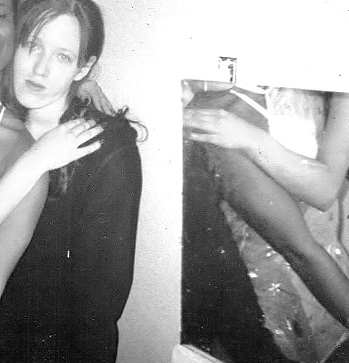
|
| Jen when working as a dancer-stripper |
TSP: In your book,
at one point you state that you do not fit the mold of a stripper. That is, that you don’t come from that “typical
background” that society generally associates (and statistics generally support) with anyone in that line of work—a
dysfunctional childhood, substance abuse, broken home. And yet, your story is just that. There is a broken home, there are
issues with your father, interaction with a boyfriend’s father who is a porn fiend and who tries to rape you. You become
a runaway at a young and vulnerable age, and there is substance abuse, yours and for others in your family. There is also
a family history of mental illness. So, what is the distinction you are trying to make?
Jen: I think that
people, especially young people, think of themselves as somehow unique. I remember sitting with other dancers in the dressing
room and trading stories about childhood and what had led them there, thinking, “Why am I here? These girls are fucked
up.” The truth was that I was fucked up too. But I couldn’t see it at the time, and I wanted to capture this.
I was on a downward spiral, and it was far easier for me to watch others slide down than it was to think about the reality
of my own situation.
TSP: What is it that
makes a girl vulnerable to this world of strippers and porn? What could have helped you make different choices? Or do you
think you might have made the same choices regardless of your circumstances?
Jen: I was, quite
simply, a young girl who was willingly seduced by a world that preys on the sort of longing that used to consume me.
It’s difficult to say whether
I would have made the same decisions if I had grown up in a different household. Perhaps, if I had been raised upper-middle
class, if my parents had stayed in love, I would have found my way far sooner or had a healthier view of relationships. But,
I doubt it. My sense of longing—that elusive thing that made me run for so many years—was something that I had
to confront internally. I was a very secretive child, and I remained secretive into young adulthood. I had the sense that
if people knew who I really was, they wouldn’t accept me, and so I created a persona.
If I had the chance to go back and
talk sense into the girl I was, I would tell her that she is beautiful and perfect on her own, that she needn’t look
outside to define herself. I would tell her to pick up a pen and write. I would tell her all this whether she heard me or
not, and that would be all I could do. Sure, I might offer her therapy. But my father did offer me therapy, and I wasn’t
yet ready to engage in it. I think sometimes we underestimate the drive of children to do exactly what they set out to do.
The one thing I think might have changed
things is education. The public high school I attended was, as many in America are, too burdened by crime to offer any valuable
education. However, I can’t even say for sure that I was open-minded enough to receive a valuable education if it had
been offered in school, but this remains the one thing I wish I could change about my life. When I did return to college,
I had a hell of a time catching up. But I enjoyed every minute of it.
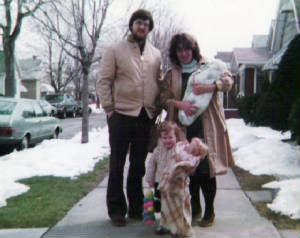
|
| The Knox family |
TSP: Tell us a little about your first experience of getting up on a stage and doing what for most young women
is unthinkable. In Musical Chairs, you vividly describe how you were convinced
to get up on that stage and dance—the drink involved, the psychological process of disconnection or numbing in your
mind …
Jen: I remember seeing it as a challenge, a thing to overcome. If I could get up on that stage and dance, naked,
I could do anything. What could be scarier than baring it all? And yet, it turned out that by resorting to drink, I was really
just falling deeper into a myth that I had created for myself. I was still seeing myself as a thing that others could define
and interpret. My longing to be seen made sense; my method did not.
TSP: You write quite a bit about “the disconnect” in the mind of a woman who strips as well as, in
part, the disconnect that apparently happens in the man who is watching. Over time, you wrote, you became more and more disconnected.
One part of your life becomes compartmentalized while in the rest of your life you move about as a young woman like any other
young woman, who wants a home, a nice boyfriend, some money in her pocket, a life dream to pursue. Tell us about this process
of disconnection you felt and how it increased over time. How does that happen? Why does it happen?
Jen: It is an odd experience to bare all in front of an audience. I suppose I thought it was something that would
make me free, when in reality it only confused my definition of self all the more. I never felt as though I was communicating
anything on stage outside of a sale.
To the customers, I felt I might as
well have been pedaling newspapers on the side of the freeway. No one looked
me in the eye; the people who paid to enter the club were all just stopping by to see a naked woman, to make a purchase and
then rush off to their real lives. The club was a den of fantasy, and in becoming another’s fantasy, I truly began to
buy into the mirage. As time passed, I felt less like a woman and more like a commodity. It was a simple transaction: The
customer paid a fee to enter, to see me, s/he tipped me and then left. I was another’s entertainment and no more. My
value was clearly defined by the amount of a tip, and this can wear at a person (even when the tips are good).
TSP: What role does substance abuse play in your life as a stripper?
Jen: Dancing was a job, and after the novelty of it wore off (which, for me, happened quickly), I found it a really
grueling job. Not only did I grow to despise most of the people who paid me to dance, but I was often the target of verbal
abuse and sexual advances. All of us in that club were. We had to put a wall up to guard ourselves from such abuse, and this
quickly becomes exhausting. Alcohol, quite frankly, made me less afraid and less self-conscious. If I was drunk, I could laugh
off a mean comment or a proposition and get back to work. If I was sober, I found the job overwhelming.
TSP: One of the aspects of this world of fantasy is that the stripper tries to make each man in her audience feel
special and desired, yet you write about the rules every stripper follows—mainly, to never date a member of the audience.
You let him get close physically—to a point—but never emotionally or intellectually. You describe how strippers
hide behind several false names, sometimes using more than one, to protect themselves. Did you ever feel that you were in
danger? What do you do when a customer’s fantasy is to make you his girlfriend, his “project” to save you?
Jen: I was quite perplexed by the first of many gentlemen who expressed a desire to save me from my life as a
stripper. These men were all customers, and as illogical as my life was at the time, I couldn’t ignore the contradiction.
Being told that I was a thing to be saved was, perhaps, one of the most difficult things to hear. I was a thing to be saved?
It was comments like these that cut through any amount of alcohol, and that stuck
with me. I didn’t buy it. Though I often entertained fantasies of being swept off my feet, I didn’t trust anyone
to actually do this. The fact that I was offended by a man’s desire to save me, however, was a good thing. It meant
I wasn’t fully buying into that fantasy, after all. It was proof that I did have some semblance of self, no matter how
difficult it was to define.
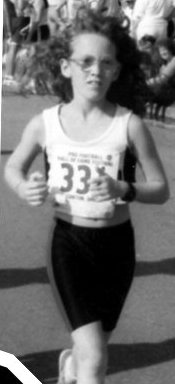
|
| Jen running track as a girl |
TSP: You write about
the exploitation that is crucial to the existence of this kind of business—the exploitation of both women and men. Tell
us more about that.
Jen: The men and
women who frequent strip clubs are not a type. They are all types. I met married, single, gay and straight men and women;
some were there for a bachelor’s parties, and others were regulars. Some were young, some old. But the exploitation
that occurs on the part of the customer at a strip club is just as prevalent as that of the girls who are dancing. People
were there to indulge in a sexual fantasy that has been literally sold to them. Pornography in any form, I believe, does not
have to be a negative thing; however, when a person is profiting off of another’s sexual drives, it is exploitation.
There’s no getting around it. I was making money off of a married man’s wandering eye or a college student’s
curiosity. I was making money off of another’s unmet desire. In this way, I was exploiting them just as much as I was
exploiting myself.
TSP: What made you
want to leave this lifestyle behind?
Jen: I wanted to
leave the lifestyle long before I actually did leave. I was in a routine: drinking throughout the day, dancing into the early
morning hours, and exposing myself in exchange for money. Addictions are really just the repetition of action, so in this
way, I was addicted to the lifestyle. There was a time in which it just seemed easier, more comfortable, to stay.
TSP: Alongside your
dancing, hand in hand, goes substance abuse. Talk to us about your process of getting sober, what worked, what didn’t
work, and how that affected your choice to be, and then not to be, a stripper.
Jen: I was scared
straight, so to speak. I endured my own version of rock-bottom. I was robbed and violently abused, and it was after this attack
that I realized I would die if I continued living the way I had been.
As I slowly began to get my life together,
I began reading every spiritual and self-help book I could get my hands on. I took karate classes with the money I had saved
stripping, and I signed up for classes. I was still drinking during this time, heavily, but I was slowly beginning to paint
a life that was better lived sober. As my college career progressed, and I began to feel content, I began suffering from panic,
thinking I was dying, and it was here that I became quite the little health nut. I do everything in moderation now. I hope
I can maintain this, but I am keenly aware how delicate the balancing act of moderation can be. I tried AA and it wasn’t
for me. I didn’t buy into the powerlessness that I had to admit to. This
was the very thing I wanted to avoid feeling. I feel my drinking was a result of a deeper issue, and as this issue resolved,
the need to drink fell away.
TSP: After shutting down to yourself and others, how did you open yourself up again? Was writing a part of that?
The repair of family relationships? Maybe forgiveness for yourself and others?
Jen: Writing gave me a reason to improve my life. With writing, I had a voice. With writing, I learned how to
forgive. This was possible because when my story was on paper, in black and white, I could see just how universal my struggle
was. Sure, my story was unique to me, and my experiences and mistakes were my own, but silence is a dangerous thing—it
makes unsavory thoughts all the more powerful. With writing, I broke my silence.
TSP: Today, your life is very different than what it once used to be. What part did education play in that transformation?
Jen: Education, especially my literary education. This gave me purpose and drive. It was, in no small way, my
savior.
TSP: Tell us something about your process of becoming a writer. In the book, you state what wanting to be seen
is important to you. Is writing a new way for you to “be seen,” in other words, to find validation? Or to be taken
seriously?
Jen: When I began to reshape my life, I didn’t want anyone to know about my past for fear of judgment. I
approached writing as a solitary art in the truest sense of solitude. But then something happened. I began to read a lot of
memoirs—something I hadn’t done since I was a little girl. I reread the memoirs of Maya Angelou. And in college,
I was introduced to other nonfiction writers: Lucy Grealy, Tobias Wolff, Joan Didion, Phillip Lopate, MFK Fischer, James Baldwin,
and so many more. These writers confided in me. They wrote unabashedly about their lives, and they showed a genuine curiosity
about their own experiences.
So, is writing a new way to be seen? Yes. I want my writing to be read and read widely. And the more I write, the more
I want to be read. But this type of expression is positive; it’s a way to share something, something beautiful and intimate:
a curiosity about the world through self-exploration. I believe that the best education is found in personal accounts of life,
those stories that zoom in on aspects of life that perplex us all. So long as I feel I have a story that might be able to
tease out some question about life, I’ll repeat it to anyone who will listen.
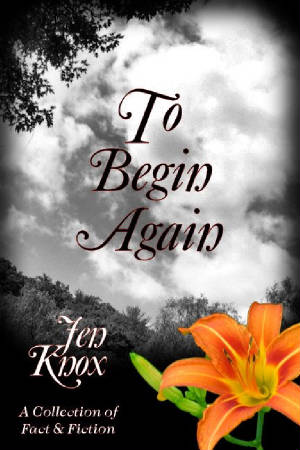
TSP: What kind of reader response have you been getting for Musical Chairs?
Has any of it been surprising to you?
Jen: People seem to have a wide variety of responses to my memoir. I have had many emails and letters from women
who have lived through similar experiences, and who have thanked me for my story. I have also received a lot of positive feedback
from psychologists and those who have suffered from anxiety, who believe that much of my story was a result of my discontent.
There have also been a few notes from women, mostly, that have expressed discomfort with my writing. I’ve received personal
emails calling me “amoral” and “disgusting.” But it all of this goes with the territory, and I’ve
learned that not everyone can relate to my journey nor can I expect everyone to empathize. For those that do, however, it
has been wholly worth the effort of publication.
TSP: You are also editor of a literary magazine. How did that come about and what can you tell us about your magazine?
Jen: Our Stories is an online literary magazine that publishes short
fiction. Each of the submissions receives a personalized response, whether we publish it or not. I’ve greatly enjoyed
reading short fiction from both upcoming and established writers, and being as how I’ve spent so much time immersed
in the study of creative nonfiction, the reading has been quite refreshing. I enjoy giving writers feedback, and most writers
are incredibly grateful for the time we take to read the submissions with care.
TSP: And, you are at work on a novel ….
Jen: Yes. Absurd Hunger my problem child, and I think he’s running
away from me, rebelling. I won’t give up on him though.
In the meantime, I’ve been writing
a lot of short fiction and short essays. I am currently working on a compilation of this work entitled To Begin Again. Each
story and essay in the collection is about new beginnings, and I do not distinguish which in the collection is fact, which
is fiction. In some cases, it is obvious; and in others, it is not. Much of my life reads like fiction.
It will be a somewhat experimental
work, and I look forward to releasing it in 2011.
TSP: How is working on a fictional piece been compared to writing a memoir? Or do you find aspects of your real
life coming through in that, too? It can be argued that writing is a kind of stripping of the writer’s soul…
Jen: I find it nourishing to the writer’s soul. And I am one of those writers who lives the cliché—I
write what I know. I don’t feel comfortable writing about anything else. Of course, my characters will have different
experiences, different genders, live in different times, but I will be forever draw on those things I have seen and known
and heard in order to create them.
The beauty of fiction
is that it offers a great deal of freedom that creative nonfiction does not. I enjoy writing it; however, with freedom comes
a wider, and often intimidating, set of options. Right now, I have too many ideas, and though I have quite a few words written
toward Absurd Hunger, my novel, I am finding that to maintain a clear storyline, I will have to make a few concessions. This
is where I am at with the novel’s progress. This is why I have taken on side projects, to let my story simmer a while
before I stir the pot again.
TSP: Thank you so much, Jen, for talking to TSP and our readers. Your message is powerful, uncomfortable, and
important. Is there a place online where readers can learn more about you and your work?
Jen: It was a pleasure. My website is http://www.jenknox.com, and I am trying my damndest to keep up a blog at www.jenknoxblogspot.com. It will be at these sites that I will post updates about my work, and
my journey as a writer.
©All materials, print, artwork and
photography on this site are copyrighted and not to be reprinted without written permission by The Smoking Poet.
Feedback, submissions, ideas? Email thesmokingpoet@gmail.com
|

